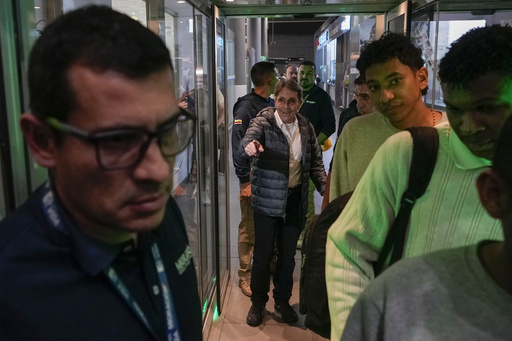
BOGOTÁ, Colombia — A significant figure in Colombia’s drug trafficking history has returned to the country after spending 25 years in a U.S. prison. Fabio Ochoa, a prominent member of the infamous Medellin cartel, was deported on Monday following the completion of most of his 30-year sentence.
Upon his arrival in Bogotá, the 67-year-old was dressed in a simple grey sweatshirt and carried his belongings in a plastic bag. As he disembarked from the flight, Ochoa was briefly met by immigration officials equipped with bulletproof vests, though no law enforcement personnel were present to apprehend him.
The immigration officers took his fingerprints and verified through their database that he does not have any outstanding warrants in Colombia. The country’s immigration department stated on social media that Ochoa was released so he could reunite with his family.
When questioned by reporters at El Dorado Airport about his past actions, Ochoa maintained he was innocent, claiming, “I was framed.” He embraced his daughter, whom he had not seen in seven years, and expressed his intention to return to Medellin to live with his loved ones.
“The nightmare is over,” he added, indicating a sense of relief after his lengthy incarceration.
Fabio Ochoa, along with his brothers, rose to riches during the surge of cocaine trafficking into the United States in the late 1970s and early 1980s, with reports suggesting they were included in Forbes’ billionaire list by 1987.
While based in Miami, Ochoa operated a distribution center for the Medellin cartel, which was led by the notorious Pablo Escobar until his death in 1993 during a confrontation with law enforcement in Medellin.
Ochoa faced indictments in the U.S. connected to various criminal activities, including the 1986 murder of American pilot Barry Seal, who was involved with the Medellin cartel. At one point, he cooperated with the Drug Enforcement Administration as an informant.
In the early 1990s, Ochoa and his brothers were able to negotiate a deal with Colombian authorities to avoid extradition to the U.S. They were released from prison in 1996 but Ochoa was arrested again in 1999 on drug trafficking charges. He was extradited to the United States in 2001 after a Miami indictment listed him among more than 40 individuals accused of drug smuggling.
Ochoa was the lone defendant in this group to go to trial, which led to a conviction and a lengthy prison sentence, as most others had pleaded guilty and received lighter penalties.
Though his name has faded from the spotlight as Mexican cartels grew in prominence, Ochoa’s story was resurrected in recent popular media. He plays a role in the Netflix series Griselda, where he initially competes with and then collaborates with Griselda Blanco, a powerful figure in Miami’s cocaine trade. He has also appeared in Narcos, showcasing his family’s affluent ranching and horse-breeding background, contrasting with Escobar’s more humble beginnings.
Richard Gregorie, a retired assistant U.S. attorney who prosecuted Ochoa, noted that authorities were unable to seize all of the Ochoa family’s illicit earnings and predicted that the former drug lord would return to a comfortable life. “He won’t be retiring a poor man, that’s for sure,” Gregorie commented earlier this month.

